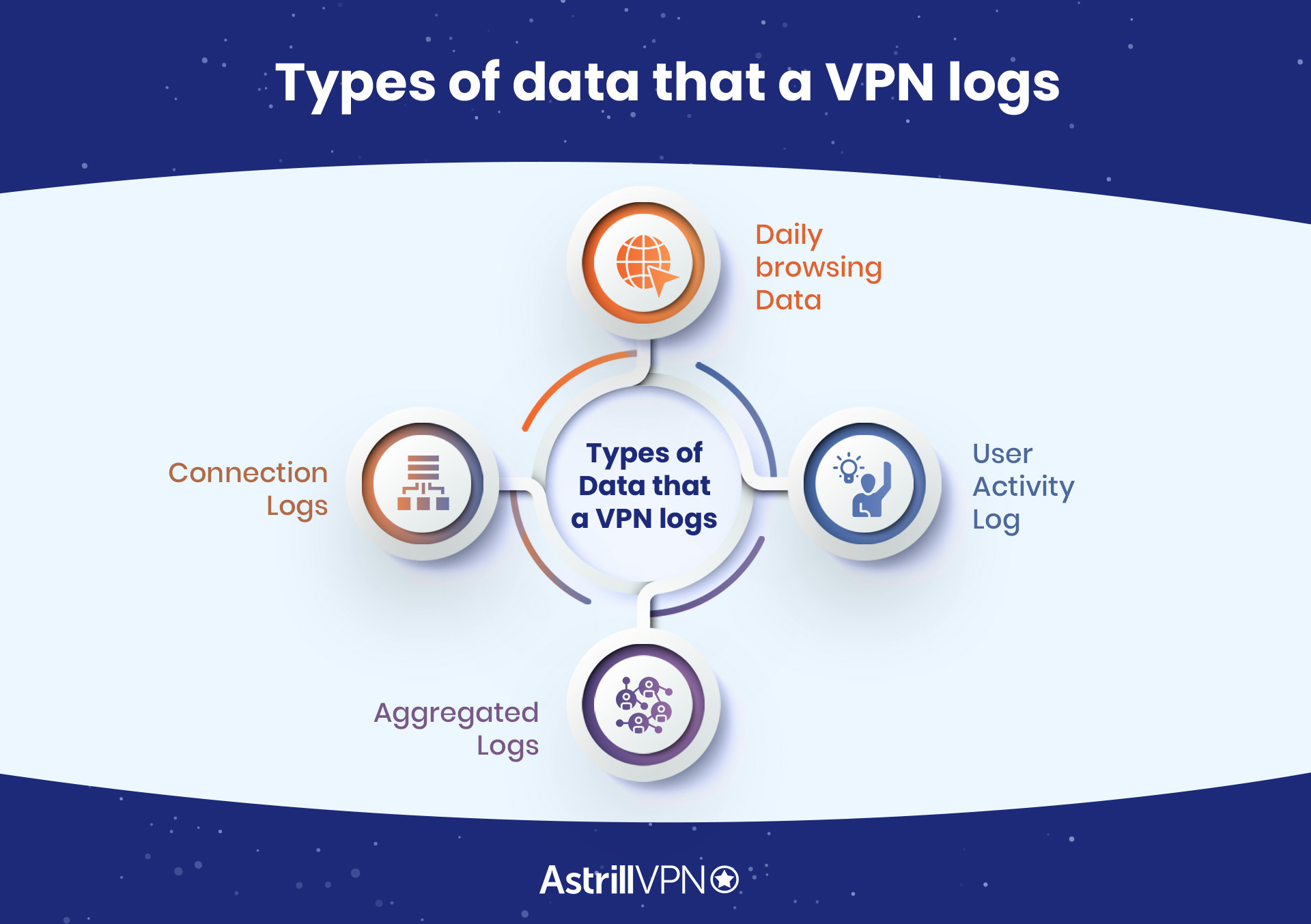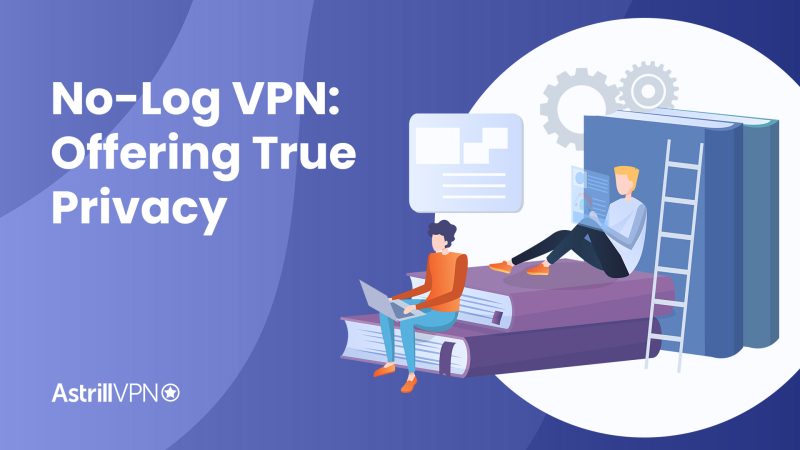With the growing popularity of VPNs, there is also a growing concern about the extent of the privacy offered. Unfortunately, many VPNs misrepresent themselves as having strong, secure no-logging policies. What’s worse is that it is becoming increasingly difficult to find a VPN that is actually secure and reliable. Many VPNs, still, silently collect data in the background that could be used to monitor or share information about your online activities.
Astrill never keeps any personally identifiable information, and only tracks the total number of transferred bytes. This is to maintain server and network upkeep as the design of the VPN itself prohibits the service provider from seeing any identifying information about their users. Moreover, once the user disconnects, the server wipes all logs.
Table of Contents
What does “no logs VPN” mean?
“No-log VPN” is a type of policy that has become a cornerstone of quality for VPN service providers. A No-log VPN is one that does not collect, store, or otherwise observe the traffic that occurs on its servers. This means that it doesn’t keep any details such as:
- Your real IP address
- The websites and services you’ve used
- The amount of bandwidth you’ve used
- When you connect and disconnect
- How long do you remain connected to the VPN for
As well as other session information, such as your traffic or general history.
This topic exists within a grey area because some countries have laws that prohibit VPNs to function without storing data for at least a certain amount of time. This means that your data must remain on their server for a legally essential period of time. The best VPNs operate out of countries without data retention laws, such as AstrillVPN which operates from Seychelles.
How will a no-logs policy protect you?
A no-logs policy means that you will have full, total security, as guaranteed. Through this policy, the VPN provider assures their consumer that they will not be tracked and none of their information will be collected, sold, rented, or traded for any means or purposes. This includes information such as their browsing history, the time they spend using certain services, their downloads, and other such information.
This policy sets the bar for what consumers can expect when they’re using the service. It is paramount to know the types of logs your provider collects and stores. As such, it is also important to see how transparent they are with their claims.
The best no-logs VPNs have their policies match up to their claims. AstrillVPN’s policies go into depth about the terminologies and language used to highlight the extent of their privacy guarantee. Additionally, for any security-conscious user, AstrillVPN also allows the manual deletion of all logs and all data.
Types of Data that a VPN logs
There are actually many compelling and valid reasons why a VPN service would want to maintain some basic logs. However, it is up to you to learn what sets of information fall into which type of logs, especially if you are looking to properly secure your anonymity and privacy. Your VPN provider may track, record, and store your IP address, server preference, or even the amount of time spent connected to the server as per its logging policies.

Daily browsing Data
Daily browsing data falls under usage logs. This can include a great amount of personal and sensitive information, which may also include your location. It is definitely a wise decision to stay away from any VPN service that collects such data because these logs can be lengthy and can risk your anonymity.
User Activity Log
This is one of the most invasive and privacy-risking types of logging. These also fall under usage logs, which can include:
- Browsing history
- DNS requests
- User metadata such as location or IP address
As such, storing this information definitely goes against the promise of security and anonymity that come attached to VPN services.
Connection Logs
These types of logs are kept for a compelling reason. Connection logs include:
- Usage of Bandwidth
- The timestamps of connection
- The IP address of the VPN server
- The IP address of the user
These logs can be stored at either the server level, which includes datasets like the bandwidth usage per server, or at the user level, which includes your IP address. This type of data is mostly used to optimize the speed and performance of the servers so that users can enjoy enhanced security and better connections.
This type of non-identifiable data helps ensures the best possible service as it allows the VPN service provider to resolve any glitches that may occur from either end.
Aggregated Logs
Aggregated logs are sets of information that are anonymized and unidentifiable to a single user. This means that the VPN service provider may collect:
- Websites visited
- Bandwidth used
- Connection timestamps
After a VPN server collects this information, they remove any identifying elements from its data. It is important to remember that most VPNs keep aggregated logs as a way to ensure the smooth running of their servers and to make sure that the server can keep up with the user demand. It is also important to know that most VPNs actually collect aggregated logs when they say that they guarantee anonymity.
There are a few types of data that can be aggregated, and it is actually the process of anonymizing the data that defines whether or not it is valid to collect and store such data. It’s always a good idea to read your VPN server’s policy to ensure that it is meeting your demands in security and privacy.
Astrill does not keep activity logs
AstrillVPN only keeps information that is crucial to the upkeep and running of their servers. Some information is actually necessary to obtain for the technical functioning of their services, such as how long a connection lasts, device type, and the AstrillVPN application version used. This information is used to ensure that all user needs are being met and that there isn’t any user that is going over the limit of devices for a single account.
They also keep up to 20 previous connection records, such as connection time and duration, country, AstrillVPN application client version number, and device type. This information can be used by their customer support service to clear any issues that the client may have in their connection, just to ensure that they can provide a solution.
AstrillVPN does allow manual deletion of all data, but the server runs in a manner where all information is automatically removed after inactivity for 30 days. AstrillVPN also does not sell, rent, or otherwise share their client’s personal information. All collected logs are retained for themselves for either customer support or server optimization.
What Kind of Logging Is Acceptable?
At times, there is legitimate cause for a VPN server to collect data. If the service provider ensures the online privacy and security of the user, it is reasonable to collect logs such as:
- Aggregated Bandwidth Usage
- Aggregated Connection Logs
- VPN Server Location
- Server Load Data
As long as the user’s anonymity is guaranteed, the above datasets can help server functionality and client experience.
What Kind of Logging is Unacceptable?
Before anything else, VPNs are a solution for user privacy. As such, there can be no legitimate reason to collect certain types of data, such as;
- Browsing Activity
- Originating IP address
- Individual user timestamps
- DNS Queries
Due to the sensitive and identifying nature of such data, the collection of these logs can risk user privacy and security. It’s best to avoid any VPN that states they collect any of these types of information.
Dangers of Using a VPN that Keeps Logs
VPNs that keep logs can pose several dangers to users, including:
Privacy Risks
VPNs that keep logs of user activity can store sensitive data like browsing history, IP addresses, and other online activities. This can lead to privacy risks, as this data can be accessed by governments, ISPs, or hackers, exposing your online identity and sensitive data.
Security Risks
Log-keeping VPNs can also be vulnerable to security breaches, exposing your data and identity to unauthorized parties. A hacker can access your login credentials, personal information, and other sensitive data without proper encryption protocols.
Legal Risks
VPNs that keep logs may be required by law to share user data with government agencies or other third parties. This can be a significant issue if you are using a VPN to protect your online identity and stay anonymous.
Reduced Performance
VPNs that keep logs may also impact performance, as they can slow down the speed of your internet connection. This can be especially problematic if you are trying to stream videos, play games, or perform other data-intensive tasks.
Conclusion
VPN logs can be good and bad. Good because they can help to ensure user experience by making sure that the right type of device is using the right client, for example. Bad because they can store identifying information that could count as a total invasion of the user’s privacy.
The bottom line is that every user has their own demands for privacy and anonymity. What reliable and reputable VPN service providers must do is maintain transparency and complete honesty when stating their policies. A good VPN provider like AstrillVPN leaves their user well informed of how their data is being collected, stored, and dealt with.




No comments were posted yet